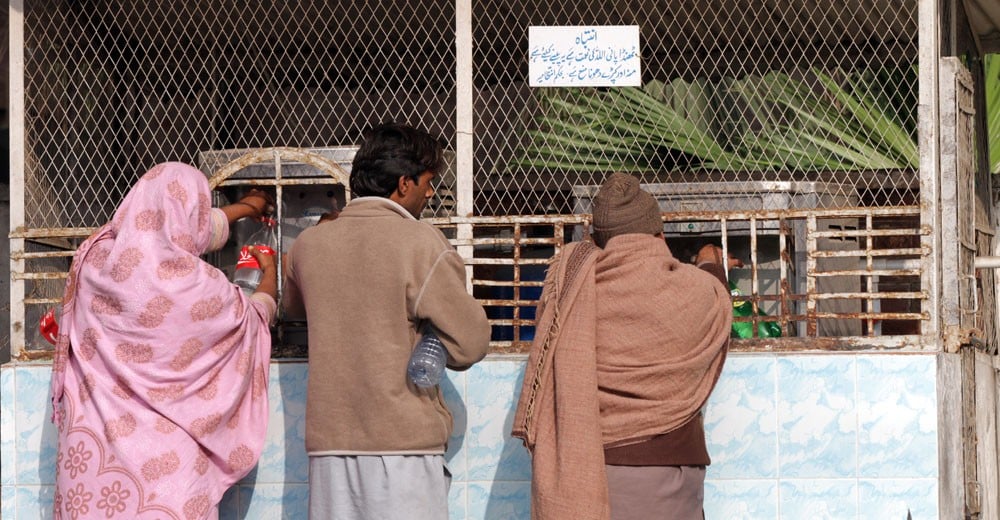
Public hospitals are without easy access to potable water. Does anyone care?

In public sector hospitals, patients and their attendants don’t have access to clean drinking water, whereas the MS and other doctors’ offices have got water dispensers installed.
Both the teaching and the district headquarters hospitals (DHQs) of the city depend on water coolers with ordinary filters to provide their patients with potable water. These filters neither clean the water properly nor are viable because their maintenance costs are high.
Both Mayo and Services hospitals have filtration plants but these are too small to provide for a huge number of patients and their attendants.
Services’s water filtration plant is installed at Gate-I and indoor patients or their attendants do not have an easy access to this.
An anonymous philanthropist is said to have installed two water machines connected with a small water filtration plant outside the clock tower of Mayo Hospital. Attendants sitting in the parking use water from these machines. But, again, these machines are at a fair distance from the OPD and the wards.
All the District Headquarter Hospitals (DHHs) of the city including Government Kot Khawaja Saeed Hospital, Govt Nawaz Sharif Yakki Gate Hospital, Shahdra Hospital, Shahdra Town Hospital, and Munshi Hospital don’t have water filtration plants.
These hospitals use water coolers connected with small water filters. But these are either out of order or have fungus growths. Given this situation, the patients and their attendants are left with no option except to buy bottled water which doesn’t come cheap.
For example, the Govt Kot Khawaja Saeed Hospital administration has installed three water coolers, one for the outdoor patients and two for the ward patients at the second floor of the facility. But the filters fixed to these machines are dirty and it seems these have not been replaced for months.
Besides, pipes of these water coolers leak due to which water gathers around the coolers.
Talking to TNS, a female patient says, "I’ve to drink water from the cooler using my hands because there is no glass. The hospital administration should arrange for disposable glasses also."
The hospital emergency has no arrangement for drinking water. Patients buy bottled water from the canteen.
The number of water machines at the public hospitals is too small to meet the need of the patients.
There are only two water coolers for outdoor patients at Mayo. These two machines are installed at the same place and the patients have to cover a long distance to fetch water. One of these machines is rusty and the other has a tap which is loose and water keeps flowing out.
According to an outdoor patient, the hospital recently installed a water cooler. "But they fixed it at the place where there is already a water cooler. They should have installed it at some other place.
"These machines have been installed at a corner, where people hardly catch sight of them."
A Kot Khawaja Saeed Hospital doctor says, on a condition of anonymity, that hospitals normally don’t care about the provision of drinking water to their patients.
"The maintenance of ordinary filters is costly and difficult. Water filters are not replaced for months due to which people are forced to drink unhygienic water even at hospitals. Water is the most neglected issue at the public sector hospitals," he adds.
Govt Nawaz Sharif Yakki Gate Hospital is also without a water filtration plant. It has three water coolers installed but whereas one of them is dysfunctional, the filters of the other two machines are choked with dirt and fungus growth.
There is no filtration plant at the Punjab Institute of Cardiology (PIC) but the administration has installed water machines at different wards with filters.
When asked about the unavailability of filtered water at the public sector hospitals of the city, Punjab Health Department Director Health Services Dr Hafeez says everyone has the right to clean drinking water. However, he claims that he "don’t know of any plans to install water filtration plants at the hospitals."
Punjab Health Education Officer Usman Ghani says the teaching hospitals are independent in their decisions. "We don’t know what kind of measures they are taking in order to address this problem. Though, the health department has issued directives to the DHHs to ensure provision of clean drinking water at the facilities. It seeks regular reports on that."
Ghani also speaks of Punjab Health Department launching a Saaf Pani Project in the province. In its first phase, water filtration plants will be set up in Bahawalpur, Okara, Kasur and Lahore; in the second phase, the project will be extended to other cities. As many as 1,500 water filtration plants are due to be installed. These plants will be operated through solar panels.